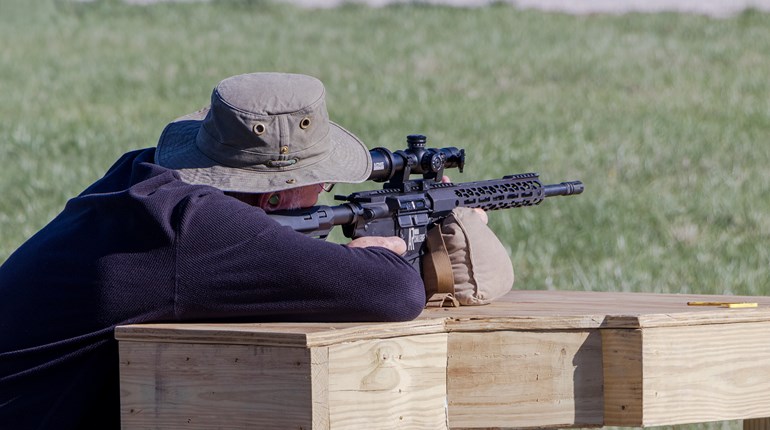
There exists a special place in ignominy for American politicians who, having been extended the trust of their voters, turn upon a dime and attempt to undermine the protections of the constitutional order that put them in office. And, within that special place, there exists an even smaller place, reserved for those whose ambitions lead them to pile transgression atop transgression and strike at many roots at once.
It is bad enough when an elected official attempts to limit a core component of American liberty such as freedom of speech. But to attempt to limit freedom of speech in the pursuit of curbing another, equally important right? That compounds the iniquity beyond all measure. As Oscar Wilde might have said, to abridge one right may be regarded as a misjudgment; to abridge two looks like tyranny. And, in America, we’ve already had that debate.
But, alas, we have apparently not won that debate in perpetuity, for across the United States we are beginning to see a series of concerted efforts to sabotage the First Amendment in an attempt to curtail the Second. These efforts take many forms, but they all have one thing in common: Their authors understand that to control speech is to control people, and thus to control politics. Appearances to the contrary, the First Amendment was not inserted first into the Bill of Rights because it is the most important precaution in the document. And yet, if it had been, the framers would not have missed the mark.
Mitch O’Farrell has introduced a measure that would require staffers at City Hall to place onto a list any business or organization that enjoys a “formal relationship” with the National Rifle Association, and then, the Los Angeles Times reports, to “lay out options for boycotting them.”
The classic image of the censor is the man with a red pen and a razor who cuts out words and messages that contravene the party line. But he, thankfully, is extremely rare in these United States—a salutary fact that has led the would-be arbiters of our national conversation to work more creatively around the system, and to try instead to prevent those whose views they disdain from ever speaking in the first place.
At the federal level, the Democratic-led House of Representatives has just passed a bill that, among other things, places more restrictions on “lobbyists”—which, of course, is just another word for the people in our society who are paid by others to “petition the government for a redress of grievances” on their behalf. To put it simply, there is no way in which one can suppress or place conditions upon “lobbying” without suppressing or placing conditions on ideas—which, again, is not a bug of Nancy Pelosi’s regulatory agenda, but the primary feature. Tellingly, the Democrats made sure that this was the first bill they introduced (there is a ghastly symmetry between its marker, “H.R. 1,” and the First Amendment, which it guts), and even had the temerity to title it the “For The People Act.” One must ask: Which people? And, given that politicians are not in the habit of limiting the influence that benefits them and their agenda, the answer seems rather obvious: You.

In California, New York and Illinois, the usual suspects are not even pretending anymore. In Los Angeles, a city lawmaker named Mitch O’Farrell has introduced a measure that would require staffers at City Hall to place onto a list any business or organization that enjoys a “formal relationship” with the National Rifle Association, and then, the Los Angeles Times reports, to “lay out options for boycotting them.” O’Farrell’s stated reason for action is that the NRA has a different conception than he does of what constitutes a “common-sense gun safety law.” And so, he says, he wants to “send a message as a city with an annual budget approaching $9 billion.” That message? That political organizations that disagree with him should be punished for their dissent.
It is difficult to imagine a more flagrantly unconstitutional measure than O’Farrell’s. The U.S. Supreme Court has made it clear on multiple occasions that all governments within the United States are prohibited from punishing businesses and other outfits whose politics they dislike. The Court made this clear during the Civil Rights era in NAACP v. Alabama, when the state of Alabama tried to prevent the NAACP from doing business in the state, and then, having been restrained, tried to subpoena the organization’s membership lists. And the Court made this clear in 1972, when it reaffirmed the general rule against government retaliation on the basis of speech and extended it even to cases in which there existed no formal or pre-existing contract. Writing for the majority in Perry v. Sindermann, Justice Potter Stewart observed that the state “may not deny a benefit to a person on a basis that infringes his constitutionally protected interest, especially his interest in freedom of speech.”
“If the government could deny a benefit to a person because of his constitutionally protected speech or associations,” Stewart continued, “his exercise of those freedoms would in effect be penalized and inhibited.”
Or, and this is just as pernicious, snuffed out in advance. In effect, O’Farrell is hoping to do one of two pernicious things. The first is to destroy the livelihood of anybody who does not think as he does. The second is to ensure that anybody who does not think as he does keeps quiet about it. If O’Farrell were to get his way—if, that is, the city of Los Angeles were to compile a list of organizations whose political opinions it deems unacceptable—the obvious result would be a decrease in the public expression of those opinions that the city has proscribed and an increase in the public expression of those opinions that the city has marked out as respectable. Or, put another way, the result would be a system in which private organizations that disagreed with the people in power were punished for their opposition to the status quo. Before long, that opposition would wither and die on the vine, which, of course, is the purpose of O’Farrell’s proposal in the first place.
That is one purpose, too, of a pair of extraordinary proposals that have popped up in the states of New York and Illinois. In New York, a Brooklyn-based lawmaker named Kevin Parker has introduced a proposal that would require any resident of the state who hopes to buy a handgun to hand over his social media passwords and search-engine history to the police for evaluation. Under Parker’s rules, the state police would be permitted to comb through three years’ worth of an applicant’s history on Facebook, Twitter and Instagram, and one year’s worth of an applicant’s history on Google, Bing or Yahoo. The police would then be given carte blanche to decide whether the applicant is a suitable candidate for handgun ownership. In Illinois, a similar idea has been put to paper by Democrat state Rep. Daniel Didech. Before long, one assumes, the idea will spread.
Once again, it is difficult to know where to start. Both Parker and Didech’s approaches represent a flagrant violation of both the First and Fourth Amendments, and seek to gut the Second Amendment by relegating it to a privilege for which one is obliged to ask permission rather than a fundamental constitutional right that is presumptively enjoyed by all.
Irrespective of the matter at hand, free people do not permit the exercise of their essential liberties to be rendered contingent upon the subjective opinion of the local police. That both Parker and Didech seem not to understand that is a significant problem in and of itself. But there are implications for free speech that are perhaps the most dramatic here. Under Parker’s measure, the police in New York would be empowered to determine who is and who is not acceptable as a gun owner—a flatly impossible task that would inevitably call upon the evaluating officer to make a series of judgment calls. What, one wonders, would count as unsuitable? Profanity? A dark sense of humor? Quoting rap lyrics? Strongly held religious beliefs? Vigorous political argument? Opposition to abortion or to gay marriage or to the banning of so-called “assault weapons”—all opposition that the governor of New York has deemed “unwelcome” in his state? And what would stop the program adopting the position that disturbed individuals must be barred from owning handguns, and that wanting to own a handgun is itself a sign of a disturbed mind?
Advocates of such measures will presumably insist that such questions represent little more than fearmongering. I disagree, and I present the history of government encroachment as my witness. But even if they are right—and even if the proposal could indeed be tightly restrained—there would remain a risk that nobody could avoid. This risk is that applicants would end up preemptively censoring themselves lest they ever need to apply for a handgun permit and, thereby, end up seeking to please the local authorities. In fact, the consequences in a state such as Illinois or New York would presumably look rather like the consequences that would attach to O’Farrell’s bill in Los Angeles: Those who are out of step with the prevailing views of their elected officials would end up staying quiet about their disagreements, while those who acquiesce would end up making that as clear as possible. There’s a word for that in America—corruption. And it must be kept far, far away from the Bill of Rights.
It is cowardice, not confidence, that has led to the ongoing attempt within the gun control movement to boycott any organization that has a relationship with the NRA.
There is a common trait that marks out those who would undermine freedom of speech, and that trait is cowardice. The man who is confident in his positions—and, by extension, in his ability to argue on their behalf and to recruit others to his side—sees no need to resort to the censorship of others, nor any reason to encourage those who disagree with him to stay quiet. By contrast, the man who suspects that his position is weak—and who, in consequence, has no faith whatsoever in the appeal of his ideas—knows instinctively that he can improve his position by removing the voices of opposition.
It is cowardice, not confidence, that lies beneath the ongoing attempts to make sure that speakers who dissent from the prevailing opinion of the faculty are kept off of college campuses. It is cowardice, not confidence, that explains the House of Representatives’ attempt to make it more difficult for “lobbyists” to make arguments that they dislike. And it is cowardice, not confidence, that has led to the ongoing attempt within the gun control movement to boycott any organization that has a relationship with the NRA. As has always been the case, the men who would police our language are fearful rather than brave, and they cannot prevail without putting their fingers on the scale.
The good news for the rest of us is that they cannot prevail without help, and that it is relatively easy to deny them that help. It is notable that, while advocates of the Second Amendment have kept the same definitions, language and agenda for decades, the gun control movement has been engaged in an endless attempt to recast its intentions and to replace its clearer language with euphemisms. It is by this process that “gun control” has been laundered into “gun safety”; that pretty much every modern firearm has been deemed an “assault weapon”; and that magazines that hold more than just a few rounds have been labeled “high capacity.” There is no reason for those who are interested in the truth to indulge this propaganda, and they should actively resist doing so.
More important still, they should resist any law that would, directly or indirectly, prefer one viewpoint over another—or, worse, make the free exercise of a constitutional right dependent upon the content of a person’s speech. The opening passages within the Bill of Rights serve as an overture of sorts, and they are full of stark and precise language. “Shall make no law” and “shall not be infringed” are not only comprehensible to all, they are adjacent within the text and act as dual bulwarks against the destruction of human freedom. That there are men among us who would use one as a skeleton key to open the other is regrettable. But the door can be easily locked.
Charles C.W. Cooke is the editor of National Review Online and a frequent America’s 1st Freedom contributor.


































